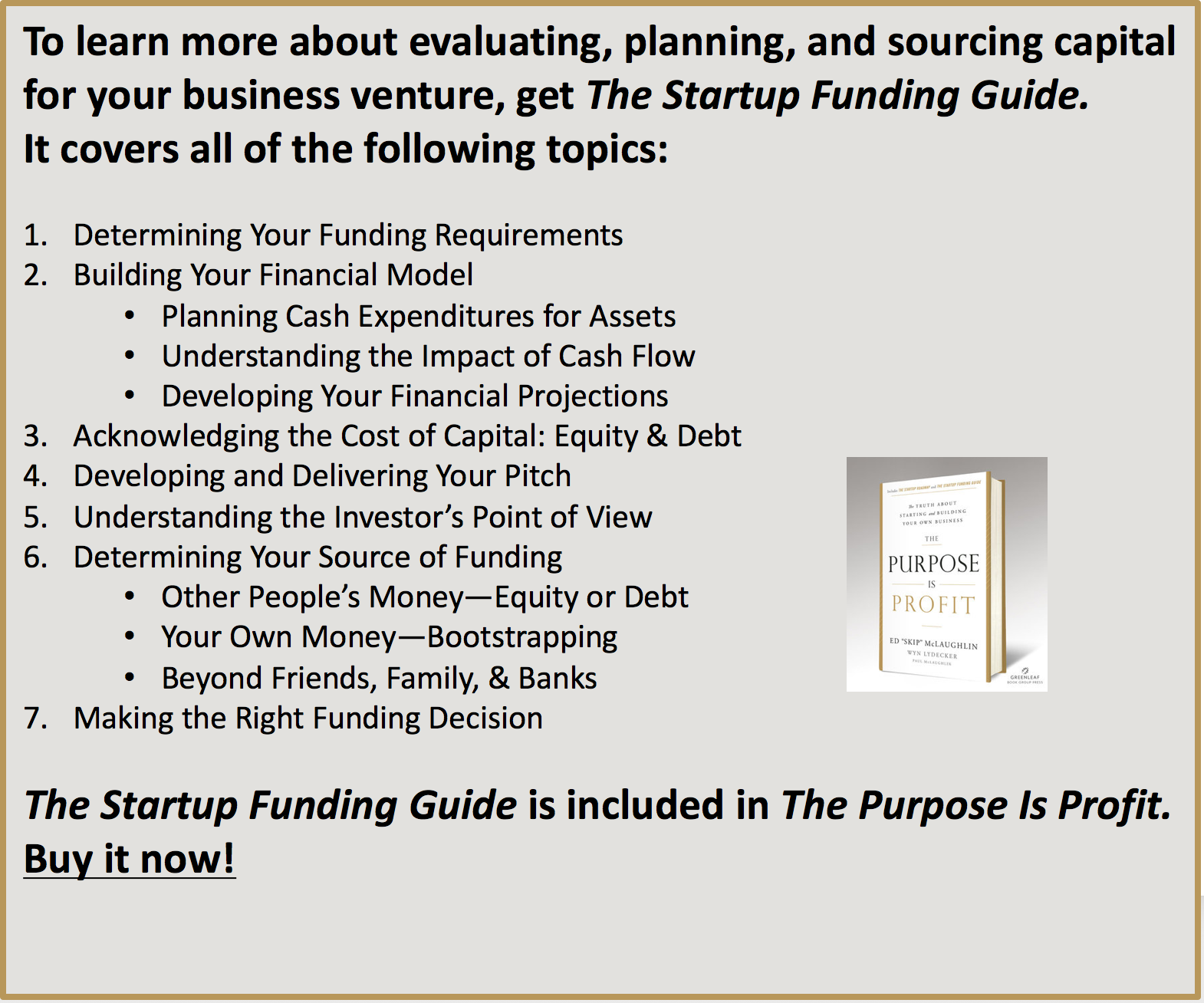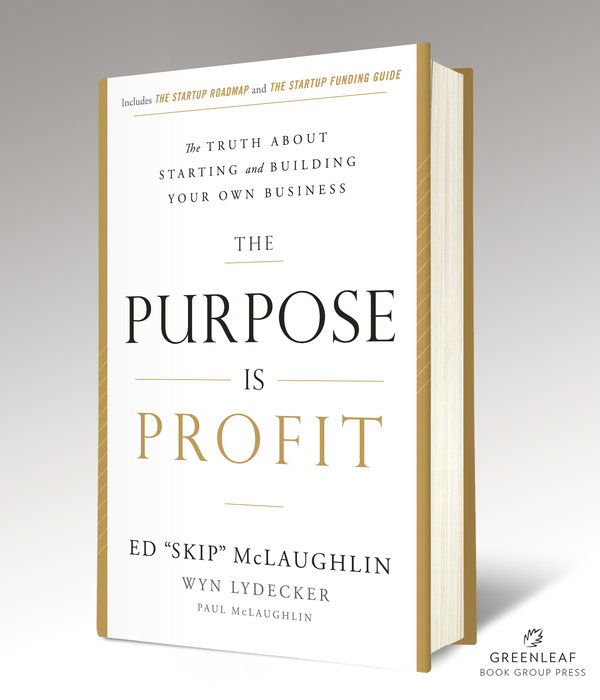By Ed McLaughlin and Wyn Lydecker
Every entrepreneur needs some sort of funding for his or her business. While I continue to believe that bootstrapping is best, it is not always an option for businesses with a long ramp-up to profitability or for a capital-intensive business.
After reading my post, When Bootstrapping is Not an Option, a reader on LinkedIn asked:
“What is the difference between venture capital and private equity?”
To begin, venture capital is a form of private equity. It’s one of three major sources of equity that is invested in businesses by private individuals – not through public markets. The other two forms are angel investors and private equity firms. Let’s dig into the differences between angel investors, venture capitalists, and private equity firms.
Angel Investors
Angels are often retired entrepreneurs or executives who want to optimize their experiences and networks and who like to keep abreast of business developments. But they are motivated beyond the pure money return – they desire to serve as mentors for the next generation of entrepreneurs.
An increasing number of angels are forming angel groups or networks so they can pool their resources of wisdom and capital and make bigger and better investments. Top business sectors favored by angel investors in 2013 included software, media, healthcare services, biotech, retail, and financial services.
Angel investors usually provide funding at the seed stage, but they don’t like to invest until the business owner has shown initiative by placing his or her own capital at risk. According to Jeffrey Sohl of the UNH Center for Venture Research, angel investments totaled $24.8 billion in 2013. That money benefited 70,730 entrepreneurial enterprises and reflected an 8.3% increase from 2012.
Venture Capitalists
Like angels, venture capitalists (VCs) invest in people, products, and ideas. While the media is full of stories about venture capitalists investing in startups, the truth is that VCs seldom actually do. Typically, their role comes at a later stage after seed-funding has been satisfied.
VCs often invest as a group and are typically willing to invest in higher risk ventures than either angels or private equity firms. This makes them very attractive to a diverse mix of enterprises and to businesses that are too small to raise capital in the public markets. According to Geri Stengel’s Forbes article, “Want Venture Capital? Here are 10 Must-Haves,” VCs like innovative market disruptors that are capable of catapulting a venture into a $100 million company, one that will capture an impressive slice of markets worth $1 billion or more.
Brian DeChesare’s article, “Private Equity vs. Venture Capital,” explains that VCs are willing to take high risks because they generate huge returns. They often stake less than $10 million for early stage companies, but they invest in dozens of them. Peter Cohan’s January, 2014 Forbes article explains the math. Only one out of ten of VC portfolio companies become big winners. Of the rest, three will succeed enough to recoup investments, and the rest go out of business.
The National Venture Capital Association reports that their investors have a history of interest in high technology companies, but if a product is disruptive and promising, they will also invest in more traditional industries like consumer and business products, manufacturing, and healthcare services.
Private Equity Firms
Private equity (PE) firms raise funds sourced from high net-worth individuals and institutional investors such as pension funds, insurance companies, and endowments. They invest these funds in a large cross-section of industries. Their investments are fewer in number than those made by angels and VCs but much larger in value. If one investment fails, the whole PE fund could fail. Marv Dumon in “What is Private Equity,” reports that most PE firms deal with middle market transactions ($50 million to $500 million) and lower market transactions ($10 million to $50 million). They seek out existing companies that are ripe for expansion or are under-optimized. They purport to help a healthy enterprise fulfill their business vision or expand their products and services by providing the needed funds.
Big PE firms like The Carlyle Group, Kohlberg Kravis Roberts, and The Blackstone Group are known for investing in leveraged buyout (LBO) transactions in mature companies. In an LBO the PE firm uses its own equity plus a large amount of debt (leverage) that they raise at the time of the deal to acquire a company or a business unit. The target company is supposed to have stable cash flows. The PE firms claim they make the companies more efficient. Through higher efficiencies and the power of leverage they hope to earn a high return on their equity investment.
If your business is in the position to seek funding from a private equity firm, quantify the PE firm’s capabilities, confirm their connections, and be sure their expertise is compatible with your business sector. This due diligence can help lead to a very positive experience.
No matter what type of funding you seek, remember that all investors expect to harvest their profits through liquidity events. You should know your investors’ expectations for exit. Usually your term sheet will spell out the details, the milestones you must meet, and the timeframe for meeting them. Based on how your company is doing and your vision for its future, you and your investors may jointly decide to sell the company to a strategic buyer, which could be another individual or another entity. If you have raised funding from angels, you may decide to seek additional expansion capital from VCs in a new round of fund raising. You and your investors could also opt to raise equity financing through an initial public offering (IPO). Be sure you discuss and understand your investors’ exit strategy before you accept their help. Your goal should be a win-win finale.
Ed “Skip” McLaughlin is the author of The Purpose Is Profit: The Truth about Starting and Building Your Own Business, along with co-authors Wyn Lydecker and Paul McLaughlin. The Purpose Is Profit is available on Amazon.com and at your favorite bookstore now.
Ed McLaughlin is the founder of four businesses and is currently running Blue Sunsets LLC, a real estate and angel investment firm based in Darien, CT. Follow him at @purposeisprofit.







Leave A Comment